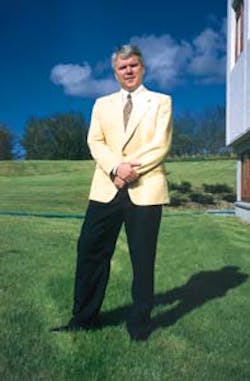NORWAY Miljoesok looks to win-win on environmental front
Jostein Mykletun, the Miljoesok president, wants a lucrative shelf and a clean shelf.Imagine the unimaginable: oil folk and environmentalists in agreement on how the offshore industry should go about its business. Yet this is the challenge that Norway's oil industry has set itself: to find ways of carrying out offshore activities in an environmentally acceptable but at the same time cost-effective manner.
The name of the campaign is Miljoesok. It was brought into being by industry and energy minister Jens Stoltenberg. Miljoesok is the offspring of Norsok. They are not characters from Norse mythology, but they are likely to loom large in the history of the Norwegian continental shelf. Under the umbrella of the Norsok initiative, the industry has united to change the economics of doing offshore business.
Now it intends to build on that experience in a pro-active attempt to find satisfactory solutions to environmental problems. "We are conscious of our responsibility, we know we pollute," says Jostein Mykletun, the Miljoesok president. "We also know that in the long run our industry must be clean if it is to be profitable. Our eventual aim is a lucrative shelf combined with a clean shelf." One of the keys to Norsok's success is the willingness to embrace cultural change, and the same approach is evident in Miljoesok's desire to get representatives from all interested parties on board at an early stage. Thus the steering group comprises representatives from the Norwegian Fishermen's Association, the ECON think-tank and the environmental research group CICERO, as well as the Statoil head, Harald Norvik, who made the original proposal for Miljoesok, and other representatives from oil companies and the supply industry.
Officials from the industry and energy ministry, the environment ministry, the Norwegian Petroleum Directorate and the state pollution control agency have observer status.
In Mykletun's view, the Norwegian oil industry would do itself no favors by imitating the adverse approach to the environmental movement displayed in many other countries. "The movement is very strong in Norway," he says. "They know what they're talking about, they know our technology. One group has even formulated its own ideas for environmentally friendly offshore platforms. The movement is an important sounding board for us."
The pro-active approach means more than just seeking minimal compliance with existing standards and requirements. "We want to stake out a set of targets and standards for ourselves that may be ahead of national and international standards," says Mykletun.
Miljoesok's first aim is to report back to the government by the end of the year, having appraised the current situation and drawn up a plan of action. Three working groups, again with representatives from outside the industry, are now preparing the ground for this report. Their briefs are to assess where Norway stands from a global perspective in terms of current environmental practice, and propose an overall strategy; to review the new generation of environmental accords and current practice; and to examine practical ways of fostering, developing and implementing environmentally-friendly and cost-effective technologies.
In a probably second phase Miljoesok will move on to the actual development of practices and technologies to realize its objectives. This is likely to entail, among other things, the setting of Miljoesok standards, and the introduction of voluntary agreements to use procedures drawn up in collaboration with the authorities. High on the list for Miljoesok's attentions are issues such as emissions into the sea, further reductions in emissions to the air of CO2, NOx and VOCs, and the use of regulatory means such as environmental impact assessments.
Norway is already well known for the strictness of its environmental legislation, which is criticized by the industry for adding to its already high costs. However, some companies have begun to respond to this state of affairs in a positive fashion by developing new technology. The most notable example is Statoil's development of a flare-lighting system which has made it possible to abolish continuous flaring on Gullfaks A and C.
In other words, there is already a base on which Miljoesok can build. And if it succeeds, Norway could be well placed to supply environmentally friendly and cost-effective technology to the rest of the world in a few years' time. But Mykletun is keen to dispel the idea that Miljoesok is based on a belief that Norway is ahead of the rest of the world. "The minister is very keen that we shouldn't present ourselves as world champions," he says. "When it comes to international debate, we don't necessarily want to be in the driver's seat but we do want to be up-front."
Copyright 1996 Offshore. All Rights Reserved.
